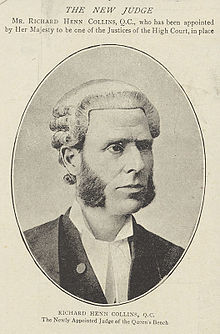Richard Collins, Baron Collins
Richard Henn Collins, Baron Collins PC (* 31 January 1842 in Dublin , † 3. January 1911 in Hove , East Sussex ) was a British lawyer who most recently as Lord of Appeal in Ordinary , due to the Appellate Jurisdiction Act 1876 as a Life Peer and Was a member of the House of Lords . Before that, he held between 1901 and 1907 as Master of the Rolls one of the highest judicial offices in the English legal system.
Life
Attorney and High Court Justice
Collins, son of a lawyer , graduated after the visit of The Royal School in Dungannon studying law at Trinity College (Dublin) and at Downing College of the University of Cambridge . After his admission to the bar ( Inns of Court ) of Middle Temple , he took up a job as a barrister in 1867 and in 1880 also worked as an investigator in corruption proceedings. In 1883 he was appointed Crown Attorney ( Queen's Counsel ) and in 1885 also so-called "Bencher" of the Middle Temple Bar Association.
In 1891 Collins was judge in the Chamber for Civil Matters ( Queen's Bench Division ) at the High Court of Justice responsible for England and Wales and held this judicial office until 1897. At the same time he was promoted to a Knight Bachelor in 1891 and has since been named "Sir". During this time he was a member of an arbitration commission in 1892 that dealt with the border dispute resulting from a territorial claim between Great Britain as the colonial power of British Guiana and Venezuela . He was also chairman of the railway commission from 1892 to 1897.
Master of the Rolls
After completing his judicial activity at the High Court of Justice, in 1897 he was appointed judge ( Lord Justice of Appeal ) at the Court of Appeal , the court of appeal responsible for England and Wales, where he worked until 1901. In addition, he was also appointed Privy Councilor in 1897. In 1901 he was also chairman of the War Fund Committee.
In 1901 he was succeeded Archibald Levin Smith Master of the Rolls and thus chairman of the Chamber for Civil Matters at the Court of Appeal. He remained in this high judicial office until 1907 and at the same time between 1901 and 1907 was also chairman of the Historical Manuscripts Commission , from which today's National Archives emerged .
In addition, in 1904 he was chairman of a commission investigating the Adolph Beck case . The businessman was the victim of a known miscarriage of justice . Beck spent several years in prison between 1896 and 1904 for crimes committed by con artist Wilhelm Meyer alias John Smith due to false testimony and poor identification methods .
Lord Justice and Member of the House of Lords
Most recently, Collins, who was also Treasurer of the Middle Temple Bar Association in 1905 , became a member of the Baron Collins , of Kensington in the County of London, as a life peer by a letters patent dated March 6, 1907 under the Appellate Jurisdiction Act 1876 House of Lords appointed to the nobility and worked as lord judge until 1910 ( Lord of Appeal in Ordinary ).
During his tenure as Lord Justice, he participated, among other things, in the judgment on the Sumpter v Hedges case (1898). In this process, from the law of contract ( Contract Law ) focused on the essential performance of contracts and compensation for unjust enrichment .
Lord Collins was the father of five children. His second son, Sir Stephen Ogle Henn Collins, was also a judge on the High Court of Justice.
Web links
- Richard Collins at Hansard (English)
- Entry in Cracroft's Peerage
- Entry in Leigh Rayment Peerage
- Lords of Appeal in Ordinary 1876-2009 in Peerages
| personal data | |
|---|---|
| SURNAME | Collins, Richard, Baron Collins |
| ALTERNATIVE NAMES | Collins, Richard Henn, Baron Collins (full name) |
| BRIEF DESCRIPTION | British lawyer |
| DATE OF BIRTH | January 31, 1842 |
| PLACE OF BIRTH | Dublin |
| DATE OF DEATH | January 3, 1911 |
| Place of death | Hove , East Sussex |

